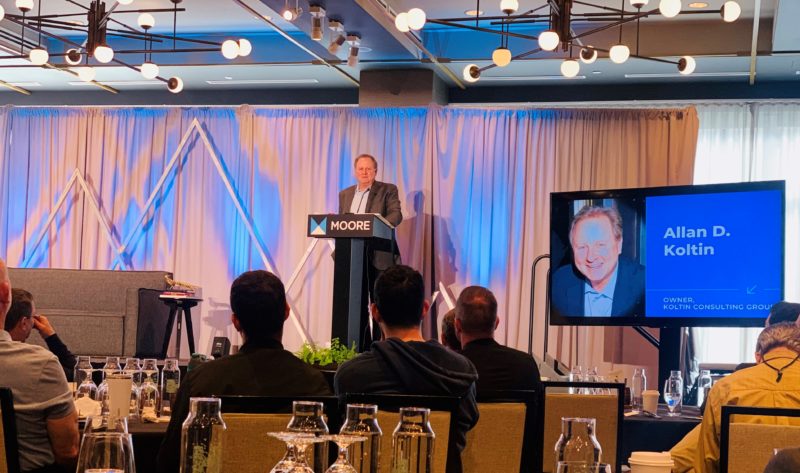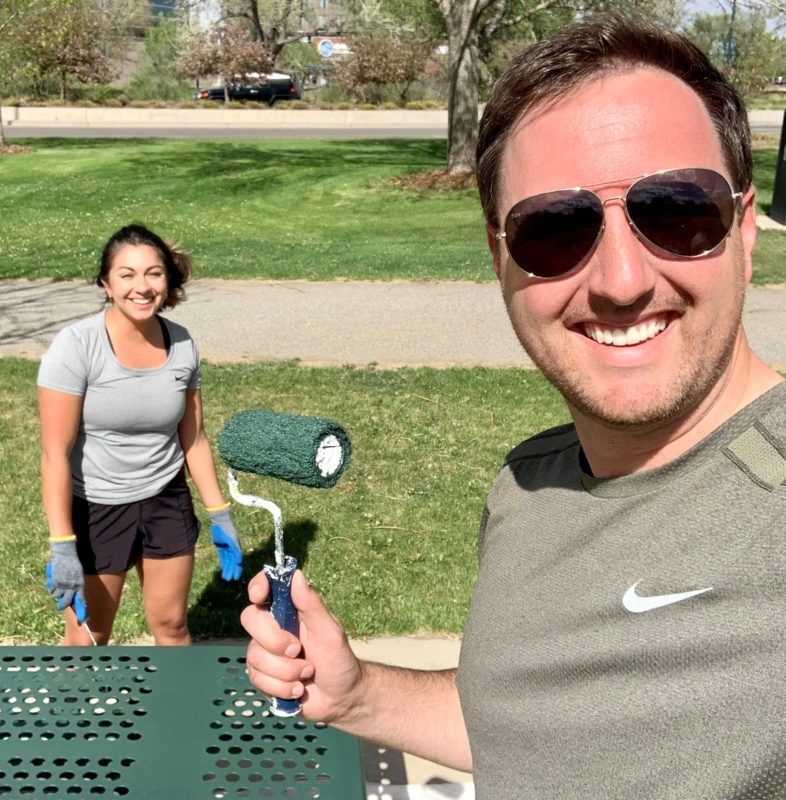
The accounting industry is changing drastically, and firms are confronted with a challenging and evolving business and regulatory landscape. During ELEVATE: The Moore North America 2022 Conference, representatives from various organizations — including Intapp — as well as leaders and professionals from Moore North America and Moore Global came together to discuss current and future challenges, and exchange ideas and best practices. Read our top takeaways from the event to learn how accounting firm management software and innovative initiatives can help your firm better prepare for the future.

Predicting the future of capital spending and the partner model
During the conference, nationally recognized speaker and industry analyst Allan Koltin, CEO of Koltin Consulting Group, shared his predictions for the accounting industry. Koltin spoke of the upcoming infusion of private equity funding into accounting firms, explaining how firms are now using capital to invest deeper in growth, talent, technology, mergers and acquisitions (M&A), and transformation of value-added products and services. He said firms that don’t follow this trend risk not being able to fund aggressive growth and transformation objectives.
Koltin also warned that the current partner model is in danger of disappearing. Firm partners often feel they should have a say in every decision given they share in the firm’s revenue; however, this doesn’t always foster good decision-making. Partners have reliably different or competing motives and interests, making the consensus-based partner model problematic. In the end, Koltin said, firm leaders must go with what’s best for the firm rather than what is best for any individual partner or group of partners.

Avoiding risk and noncompliance
Intapp speakers emphasized that when taking on new clients and new engagements for existing clients, firms must ensure they comply with any independence requirements associated with providing services to those clients and the clients’ affiliates. The midmarket focus of most accounting firms — coupled with the tremendous increase in private equity investment in the midmarket over the past few years — raises significant new risk and compliance challenges for the accounting industry.
Private equity ownership of clients is notoriously complex to manage and track, which oftentimes leads to independence impairments that firms are simply not aware of until it’s too late. Firms that employ best practices are emphasizing systems which address client and engagement acceptance in a robust and thoughtful way, and that are efficiently integrated with their management systems.
Follow these best practices to help ensure your systems and process requirements address the influence of private equity in your firm’s client base:
- Ensure that your private equity clients understand that maintaining independence is a shared responsibility between accountant and client. Keep in regular contact with private equity firms — not only those which themselves are audit clients, but also those that hold ownership stakes in your audit clients. Your staff must understand the entirety of that fund’s portfolio and the independence associated with services provided to the fund’s other portfolio companies.
- From a systems perspective, employ robust corporate tree management capabilities integrated with your client management systems to assist lead engagement partners in understanding the ownership structure of their clients and affiliates, and to develop a clear picture of all service relationships with the organization.
Client management software for accounting firms, like Intapp Risk & Compliance, enables firms to surface, assess, and monitor client information. Intapp Risk & Compliance enables client risk assessment, conflicts and independence search and resolution, corporate tree management, and the real-time tracking of risk indicators to support good decision-making around acceptance and continuance. Intapp accounting firm management software streamlines these critical risk management activities, and helps your firm establish and follow robust risk processes throughout the entire client and engagement lifecycles.
Firms looking to work with clients from newer industries may also wish to leverage Intapp Risk & Compliance to help with their risk assessment processes. Take, for example, the cannabis industry: Traditionally, accounting firms may have shied away from accepting clients involved in cannabis due to both legal issues and unacceptably high risk factors. As cannabis is increasingly legalized and socially accepted in more regions, more firms are willing to onboard clients involved in the cannabis industry; however, this requires a finely tuned and adaptive risk assessment process that can account for and manage the new types of risks and characteristics this industry could introduce to a firm’s risk profile and client base.
Recruiting a new generation of talent
Accounting firms are finding that the candidate pool has changed. More students are choosing business, management, or finance majors due to the difficulty of the accounting degree and CPA exam. With more than just the Big Four recruiting top talent — and with some firms offering better pay and benefits than the Big Four — the competition for entry-level candidates across the industry has grown more intense, especially in audit where there appears to be the lowest supply of new talent.
Dr. Sharon Lassar, Director of the School of Accountancy at the University of Denver, spoke at length about her research into the drivers and motivations of college students when exploring careers. This spawned robust discussions around the acute pain that all accounting firms are facing in recruiting and retaining new talent. In addition to more pay, graduates are looking for firms that offer work-life flexibility and clear ways to grow in their roles, versus the incumbent “up-or-out” partnership model.
Investing in advanced accounting firm management software can help promote better work-life balance by automating processes and minimizing time spent on tedious administrative tasks. Intapp Time, for example, saves accounting professionals hours of non-billable work by automatically capturing and entering time. Intapp Time also helps timekeepers — who often struggle to keep track of all their hours, tasks, and clients — avoid the loss of revenue associated with inaccurate or lost time capture. Let your firm’s professionals focus on more value-driven work and build the skills they need to advance in their careers.
Retaining talent and building a supportive community
Once you bring in new hires, how do you ensure that they want to stay with your firm? Implementing and supporting diversity, equity, and inclusion (DEI) efforts is essential, as Arianna Savoca, Human Resource Manager at Grassi, revealed. Savoca formalized the Grassi DEI Council, which promotes equality and advancement of the firm’s diverse workforce. She also helped redesign entry-level and firmwide technical trainings to be more inclusive, setting up team members of all backgrounds and abilities for success.
Additionally, a growing number of professionals now expect firms to prioritize mental health. Many people have struggled with mental health during the COVID-19 pandemic, including stress due to the adoption of remote environments. Some professionals miss the in-person connection, while others struggle to collaborate successfully with one another via technology.
Investing in collaboration tools can support teams and help them feel less isolated. For example, Microsoft Teams lets users share files, collaborate on documents, and chat via messages or video. Users can enhance their Microsoft experience by implementing Intapp Collaboration & Content, a document management software for accounting firms that integrates with Microsoft Teams and other Microsoft 365 products to provide a unified engagement overview. This is particularly helpful for new hires who may not know where to look for certain files or data; rather than search through multiple applications, they can now easily search within a single source of truth.
Another very important benefit of collaborative systems is improved documentation supporting the firm’s quality management requirements. Important documentation is no longer in one person’s emails or another person’s hard drive, reducing the risk of lost data when professionals leave their firms. Professionals can also quickly and easily access and update key information within the system, allowing them to work more efficiently and have the most accurate data at their fingertips.
Additionally, firms may consider offering a hybrid workplace, allowing those who feel comfortable meeting others in person to return to the office. Consider offering lunches, happy hours, or other fun activities to boost morale and help your teams feel more connected.

However, to truly build a strong workplace culture, your leadership must embrace and reflect the firm’s values. Moore states that its mission is to help people and their communities thrive, which is why Moore leaders and other ELEVATE attendees volunteered with Denver Parks and Recreations, where they completed a week’s worth of labor in just 2 hours.
Additionally, Moore promoted environmentally conscious initiatives throughout the conference. The association asked attendees to bring their own water bottles, and set up refill stations throughout the conference location to minimize plastic waste. Moore also committed to offsetting the carbon emissions from attendees’ flights.
By building a supportive work culture and reflecting firm values, you and your leaders will encourage more talent to both apply and remain at your firm.
Schedule a demo to learn how Intapp can help your firm better connect its people, processes, and data.